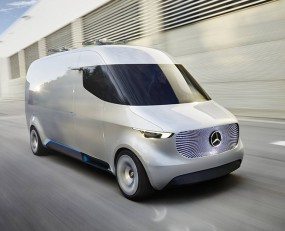
Since Amazon announced to a somewhat incredulous world that it was working on using drones to deliver goods to customers, the world has been partially gripped by the prospect of flying robots delivering parcels to houses.
The results so far have not been overwhelming. Amazon has yet to make a reality of its idea, despite a lot of supposedly secret research and development activity, whilst DHL’s attempt at a pilot project in southern Germany was foiled by some fog.
This has not stopped Daimler. Its Mercedes-Benz Van business has just announced a remarkable, possibly bizarre, project for semi-autonomous vans capable of launching drones off the top their roofs.
Called the ‘Vison Van’ it is an electric vehicle with a range of 270 km that seeks to merge “numerous innovative technologies and serve[s] as the central, intelligent element in a fully connected delivery chain.” The loading of the vehicle is designed to be fully automated with “innovative algorithms control[ing] order picking, the loading of packages…[and] calculate ideal delivery routes for the package deliverer.
Automatic order picking takes place at the logistics centre, for example, and consignments are loaded into special racking systems. Driverless handling vehicles load the racks by way of an automated one-shot loading process.” The resulting is that the van has a “package dispenser”, which is a hatch in the side of the vehicle that hands over the package without the need for the driver to enter the back of the van.
The piece de resistance is the ability of the vehicle either to launch or land drones on the roof. The drone system, designed by US company Matternet, can deliver loads of 2 kg distances of 20 km. It appears that the concept is that consignments can be delivered from the warehouse to the van as it moves around its delivery route in order to increase responsiveness, or they can be used to deliver to customer’s houses from the van.
Mercedes Benz state that the ability to integrate “the intelligence of a state-of-the-art logistics depot into a van[…] will increase productivity up to 50% in last-mile delivery services”.
Whilst it appears that this project is still some distance from being implemented, at least it does illustrate that last-mile productivity does have the potential to be transformed through the utilisation of both soft and hardware. This would represent a big change for a sector which is typically very low-tech and driven by the desire to avoid even the most rudimentary investment.
Source: Transport Intelligence, September 8, 2016
Author: Thomas Cullen